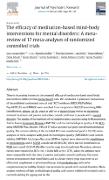The efficacy of meditation-based mind-body interventions for mental disorders: a meta-review of 17 meta-analyses of randomized controlled trials

Date
2021-02Author
Vancampfort, Davy
Stubbs, Brendon
Van Damme, Tine
Smith, Lee
Hallgren, Mats
Schuch, Felipe
Deenik, Jeroen
Rosenbaum, Simon
Ashdown-Franks, Garcia
Mugisha, James
Firth, Joseph
Metadata
Show full item recordAbstract
There is increasing interest in the potential efficacy of meditation-based mind-body interventions (MBIs) within mental health care. We conducted a systematic metareview of the published randomized control trial (RCT) evidence. MEDLINE/PubMed, PsycARTICLES and EMBASE were searched from inception to 06/2020 examining MBIs (mindfulness, qigong, tai chi, yoga) as add-on or monotherapy versus no treatment, minimal treatment and passive and active control conditions in people with a mental disorder. The quality of the methods of the included meta-analyses using A Measurement Tool to Assess Systematic Reviews (AMSTAR) and the methodological quality of the RCTs using AMSTAR-Plus. Sixteen (94%) of 17 meta-analyses had good overall methodological quality. The content validity of the included RCTs was considered good in 9 (53%) meta-analyses. In meta-analyses with good methodological quality (AMSTAR 8≤) and content validity (AMSTAR+ 4≤), large effect sizes (0.80 or higher) were observed for mindfulness in schizophrenia and in ADHD, a moderate (0.50 ≤ 0.80) effect size for mindfulness in PTSD and a small (0.20 < 0.50) effect size for yoga in schizophrenia No serious adverse events were reported (n RCTs = 43, n in the MBI arms = 1774), while the attrition rates were comparable with the rates in passive and active control conditions. Our meta-review demonstrates that mindfulness and to a lesser extent yoga may serve as an efficacious supplement to pharmacotherapy, and psychotherapy and can be complementary in healthy lifestyle interventions for people with mental disorders. Meta-analytic evidence of high methodological quality and content validity of included trials is currently lacking for qigong and tai chi.
URI
https://doi.org/10.1016/j.jpsychires.2020.12.048https://kyuspace.kyu.ac.ug/xmlui/handle/20.500.12504/286
